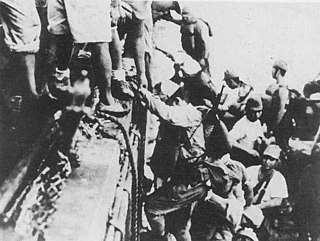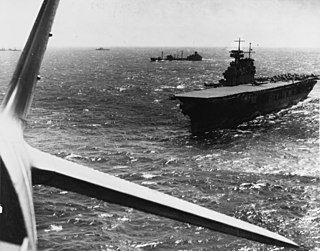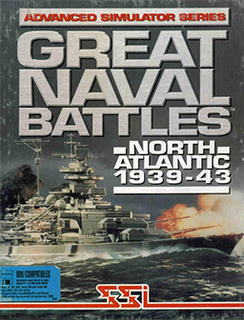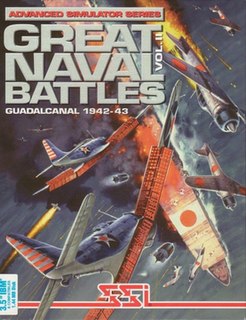
The Mare Island Naval Shipyard (MINSY) was the first United States Navy base established on the Pacific Ocean. It is located 25 miles northeast of San Francisco in Vallejo, California. The Napa River goes through the Mare Island Strait and separates the peninsula shipyard from the main portion of the city of Vallejo. MINSY made a name for itself as the premier US West Coast submarine port as well as serving as the controlling force in San Francisco Bay Area shipbuilding efforts during World War II.

Axis & Allies is a series of World War II strategy board games. The first version was first published in 1981 and a second edition known retroactively as Axis & Allies: Classic was published in 1984. Played on a board depicting a Spring 1942 political map of Earth divided by territories, players take the role of one or more of the five major belligerents of World War II: the Axis powers of Germany and Japan; and the Allied powers of the Soviet Union, the United Kingdom, and the United States. Turn rotates among these belligerents, who control armies of playing pieces with which they attempt to capture enemy territories, with results determined by dice rolls.

Task Force 16 (TF16) was one of the most storied task forces in the United States Navy, a major participant in a number of the most important battles of the Pacific War.

The History of United States Naval Operations in World War II is a 15-volume account of the United States Navy in World War II, written by Samuel Eliot Morison and published by Little, Brown and Company between 1947 and 1962.
The Operational Art of War (TOAW) is a series of computer wargames noted for their scope, detail, and flexibility in recreating, at an operational level, the major land battles of the 20th century. A Norm Koger design, TalonSoft published the first of the series in 1998. Matrix Games bought the rights to the franchise and created a new game in 2006, TOAW 3, which was the first non-Norm Koger designed game in the series.

The Tokyo Express was the name given by Allied forces to the use of Imperial Japanese Navy ships at night to deliver personnel, supplies, and equipment to Japanese forces operating in and around New Guinea and the Solomon Islands during the Pacific campaign of World War II. The operation involved loading personnel or supplies aboard fast warships, later submarines, and using the warships' speed to deliver the personnel or supplies to the desired location and return to the originating base all within one night so Allied aircraft could not intercept them by day.
Avalanche Press is an American company that publishes board wargames and has published some role-playing game supplements. They have produced The Great War at Sea and Panzer Grenadier series, as well as Red Parachutes, one of their earliest games and a detailed study of the Soviet crossing of the Dnepr River in 1943.

Gary Grigsby is a designer and programmer of computer wargames. In 1997, he was described as "one of the founding fathers of strategy war games for the PC." Computer Games Magazine later dubbed him "as much of an institution in his niche of computer gaming as Sid Meier, Will Wright, or John Carmack are in theirs."

The Solomon Islands campaign was a major campaign of the Pacific War of World War II. The campaign began with Japanese landings and occupation of several areas in the British Solomon Islands and Bougainville, in the Territory of New Guinea, during the first six months of 1942. The Japanese occupied these locations and began the construction of several naval and air bases with the goals of protecting the flank of the Japanese offensive in New Guinea, establishing a security barrier for the major Japanese base at Rabaul on New Britain, and providing bases for interdicting supply lines between the Allied powers of the United States and Australia and New Zealand.
Matrix Games is a publisher of PC games, specifically strategy games and wargames. The US LLC company is based out of Ohio (USA), and the UK Ltd company is based out of Epsom, Surrey (UK).

Jinichi Kusaka, was an admiral in the Imperial Japanese Navy during World War II. Fellow Admiral Ryūnosuke Kusaka was his cousin.

Kakuji Kakuta, was an admiral in the Imperial Japanese Navy during World War II. He is noted for his role in commanding Japanese naval aviation units in the Pacific War.

USS George F. Elliott (AP-13) was a Heywood-class transport acquired by the U.S. Navy during World War I and then reacquired by the Navy for service as a troop carrier during World War II. In 1942, she was attacked off Guadalcanal by Japanese planes and sank shortly thereafter.
A naval offensive is the aggressive deployment of naval forces during a military campaign to strategically, operationally or tactically provide secure use of shipping routes, or coastal regions for friendly shipping, or deny them to enemy shipping.

Task Force 17 (TF17) was an aircraft carrier task force of the United States Navy during the Pacific Campaign of World War II. TF17 participated in several major carrier battles in the first year of the war.

Strategic Command 2: Blitzkrieg is a grand strategy computer game developed by Canadian studio Fury Software, and published by Battlefront.com in 2006. The second game in the Strategic Command series, Blitzkrieg is a turn-based strategy set in World War II, focusing on the European Theater. The player controls all of either Axis or Allied states.

Great Naval Battles: North Atlantic 1939-1943 was the first game in the Great Naval Battles series, published in 1992 for DOS.
In the beginning of World War II the Royal Navy was the strongest navy in the world, with the largest number of warships built and with naval bases across the globe. Totalling over 15 battleships and battlecruisers, 7 aircraft carriers, 66 cruisers, 164 destroyers and 66 submarines. With a massive merchant navy, about a third of the world total, it also dominated shipping. The Royal Navy fought in every theatre from the Atlantic, Mediterranean, freezing Northern routes to Russia and the Pacific ocean.

Great Naval Battles: Guadalcanal 1942-1943 is the second game in the Great Naval Battles series, published in 1994 by Strategic Simulations for DOS and PC-98.














